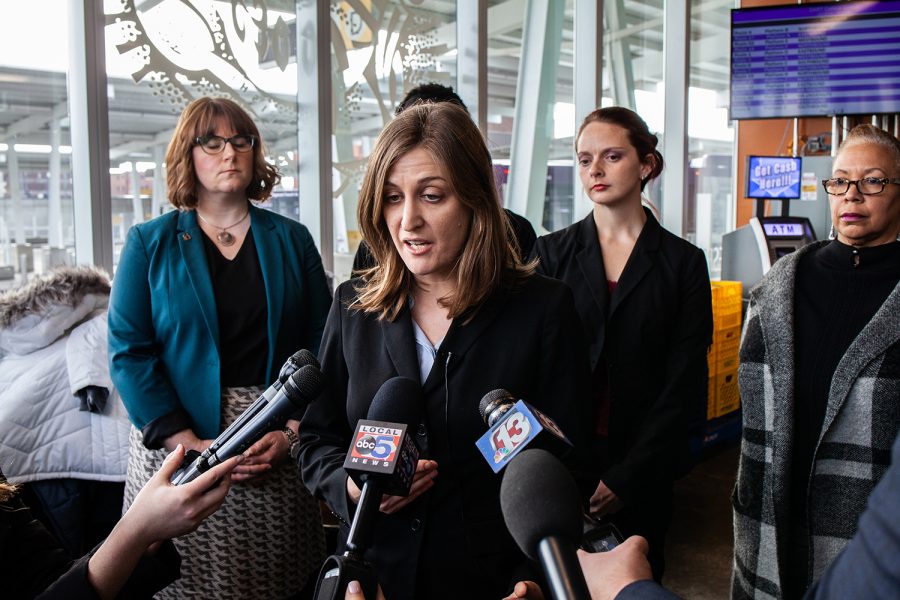Hearing over fetal-heartbeat law held in Polk County
A motion for summary judgement in an ongoing lawsuit over Iowa’s controversial fetal-heartbeat law was heard by a Polk County judge. The judge will make his ruling in the next 60 days.
ACLU Legal Director Rita Bettis speaks to the press following a hearing on the fetal-heartbeat law at the Polk County Courthouse on Friday, December 7, 2018. The decision on whether or not to put the bill into effect that would ban abortions after a fetal heartbeat is detected, around six weeks, could take up to 60 days. (Wyatt Dlouhy/The Daily Iowan)
December 7, 2018
Opponents of Iowa’s controversial “fetal-heartbeat” law, that would ban abortions after a fetal heartbeat is detected, argued that “the law is patently unconstitutional and would gravely harm Iowa women if allowed to take effect,” in an ongoing lawsuit against the state of Iowa.
At a hearing in Polk County Friday, Judge Michael Huppert did not make a ruling on a motion for summary judgement that was filed in September, but said that he would make his ruling in the next 60 days.
Summary judgement asks the court to decide a case based on the parties’ legal arguments without waiting for a trial, claiming the basic facts of the case are not in dispute.
The motion was filed by co-petitioners Dr. Jill Meadows and Planned Parenthood of the Heartland, both represented by Planned Parenthood and the American Civil Liberties Union of Iowa, and the Emma Goldman Clinic of Iowa City against Gov. Kim Reynolds, the Iowa Board of Medicine, and the state of Iowa.
“Summary judgement is warranted here because there is really only one fact that this court need find to decide this case and it’s an undisputed fact,” Alice Clapman, an attorney for Planned Parenthood, said during the hearing. “That is the fact that a six week embryo is not viable outside the uterus. Under the law, that is conducive to establish that the ban is an unconstitutional pre-viability ban.”
Martin Cannon with the Thomas More Society representing the state of Iowa and defending the heartbeat law challenged Clapman’s call for summary judgment.
“Summary judgement is not appropriate when material facts are in dispute. In this case, material facts are in dispute,” Cannon said during the hearing.
Cannon went on to dispute facts listed in the complaint, including Planned Parenthood and other opponents’ claims that the law would ban nearly all abortions, that legal abortion is one of the safest procedures and safer than childbirth, and that cardiac tones, or heartbeats, generally are detectable at six weeks even earlier.
“That is heavily disputed,” Cannon said when referring to when heartbeats can be detected.
Related: Heartbeat bill temporarily blocked lawsuit continues
The argument over heartbeats and how they are detected drew lengthy debate from both sides.
While Clapman argued that a heartbeat could be detected as early as six weeks using a transvaginal ultrasound, Cannon contended that under the law a heartbeat must be detected using an abdominal ultrasound, using which he said a heartbeat would be detected in the seventh week.
Cannon also responded to concerns over limiting the time window during which women could seek an abortion, contending that the law still provides time for women to seek an abortion.
“This bill does not ban one single abortion. Not one. It simple requires that all abortions be done earlier,” Cannon said during the hearing. “If you’re going to have an abortion, do it promptly before the child reaches this milestone that is so compelling, so provocative, so instinctively understood by people that it has a heartbeat and is living under ordinary standards.”
The fetal-heartbeat law was set to go into effect on July 1 of this year.
However, the law was temporarily blocked on June 1 by an Iowa district court judge after the ACLU of Iowa and Planned Parenthood of the Heartland filed a lawsuit against Reynolds and the Iowa Board of Medicine to stall the law both temporarily while the suit makes its way through the courts and block it from permanently going into effect.
The law aims to ban physicians from performing most abortions after a fetal heartbeat is detected, which can occur at around six weeks. The fetal-heartbeat law was passed in the 2018 legislative session.
The Iowa Supreme Court also ruled this summer that a mandatory 72-hour waiting period for all women seeking abortion violates the state constitution. The waiting period requirement was a part of a law that legislators passed in 2017 that was signed by then-Gov. Terry Branstad while Reynolds was his lieutenant governor.
That waiting period requirement was also challenged by Planned Parenthood of the Heartland and the ACLU of Iowa.
The Iowa Supreme Court’s ruling on June 29 declared that Iowa women have a fundamental right to abortion under the Iowa Constitution, causing legal experts to question the chances of the fetal-heartbeat law the case is heard by the highest court in Iowa.
During the hearing Friday, Cannon argued that the Iowa Supreme Court’s ruling didn’t explicitly prevent abortions from being regulated.
“The other side wants to say if a three-day delay on otherwise legal abortions can’t pass muster, then a prohibition on some of those abortions can’t either,” Cannon said during the hearing. “I think they misunderstand the ruling [and] assume things not in it. The court did not say we can’t regulate abortion. They didn’t say that 72-hours failed because it was too great in restriction. 72 hours failed because it wasn’t narrowly tailored under the strict scrutiny analysis.”
Related: Iowa Supreme Court backs pro-choice protection
Proponents of the law have said they would like to see it go all the way to the U.S. Supreme Court as a case that could potentially overturn the Roe v. Wade precedent. Before making it to the U.S. Supreme Court, the law would have to be taken up by the Iowa Supreme Court.
However if the Iowa’s highest court rules that the fetal-heartbeat law violates the Iowa Constitution, it would be difficult for advocates of the law to get it before the U.S. Supreme Court because federal courts don’t generally decide debates over state constitutions, The Des Moines Register reported.
Related: No exceptions group seeks to join abortion suit
Rita Bettis, ACLU of Iowa Legal Director told reporters after the hearing she didn’t think a trial would be necessary.
“The Iowa Supreme Court has decided just earlier this year that abortion is a fundamental right under the Iowa Constitution,” Bettis said. “…Because of that, we know that this law is unconstitutional because it restricts abortions so early in pregnancy.”






